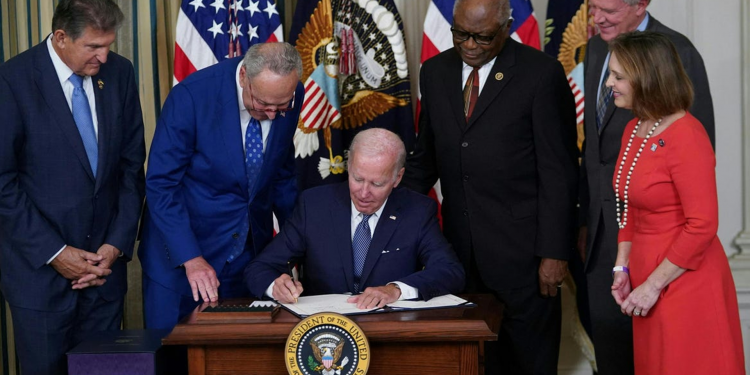A $700 billion measure has been signed by US President Joe Biden focused on tackling climate change, reducing healthcare costs, and principally boosting taxes on the wealthiest. Additionally, this Act contains provisions to carry on long-standing congressional commitments to lower the cost of prescription medications. The final bill is a scaled-back version of the Democrats’ initial $3.5 trillion proposal.
The rising inflation in the world has caused several states to revalue their policies. The already made plans and policies are not benefitting the affairs amid the rising inflation. Presently, the world is in a strong grip of problems related to healthcare costs, taxes, the economy, and climate.
To incline with the current situation, a bill has recently been passed in the United States.
At the time, the President of America signs the $740 billion Inflation Reduction Act into legislation. This act is coming from one of the leading economies of the world.
Joe Biden’s law makes the largest contribution against environmental change in American history.
Besides, inflation, climate change, and taxes are also upsetting economic conditions.
The $740 billion law is related to climate change, healthcare, and tax bill. Its approval by US President Joe Biden has delivered a much-needed win to the Democratic Party before the November midterm elections.
This is a historic climate investment in lowering carbon dioxide emissions and mounting prices.
US President Joe Biden Bill: According to the statistical analysis,
- The projected $740 billion program consists of $300 billion to reduce deficits and $440 billion in new investment.
- The law will produce $740 billion in income in the coming ten years with an arrangement of greater corporate taxes, stock buyback taxes, and more enforcement of tax regulations on high-income individuals.
- It is the highest federal outlay in this area ever because of the law’s $375 billion provision for the fight against climate change.
- According to the research by the Climate Action Tracker, the provisions of the bill will greatly reduce future global warming.
- By 2030, it is anticipated that US emissions will have decreased by up to 44% in comparison to the current trajectory, which could lower emissions by up to 35%.”
These legislations will make greater economic sense with help from the government.
Even the approval of the bill is one of the parliamentary agendas of Biden with the greatest victories so far. This bill is a step forward in delivering more fundamental promises to people in the Biden administration.
Healthcare is another important component of the law. It contains $64 billion to help individuals in managing their health insurance payments. Furthermore, it sets a $2,000 annual limit on medical expenses for Americans with insurance of Medicare health.
Additionally, the law provides over $4 billion to support western US states like California and Arizona in dealing with the historic shortages that have damaged sources of water and fueled massive wildfires.
The year so far has been challenging for US President Joe Biden.
The provision in the law allowing the government to negotiate lower rates for specific prescription pharmaceuticals covered by the Medicare health insurance program for people aged 65 and over is one significant advancement.
The Congressional Budget Office predicts that during the following ten years, this will result in savings of hundreds of billions of dollars.
US President Joe Biden highlighted the bill’s historic importance while pointing out that every Republican in Congress opposed it.
A substantial piece of legislation that deals with minimum tax rates, healthcare expenses, and climate change has been signed by President Biden. The legislation’s components are intended to fight climate change, lower the cost of prescription drugs, and significantly increase spending on renewable energy sources.
The law represents a significant advancement for US President Joe Biden’s domestic program, despite criticism and the fact that some proposals did not make it into the final text.













